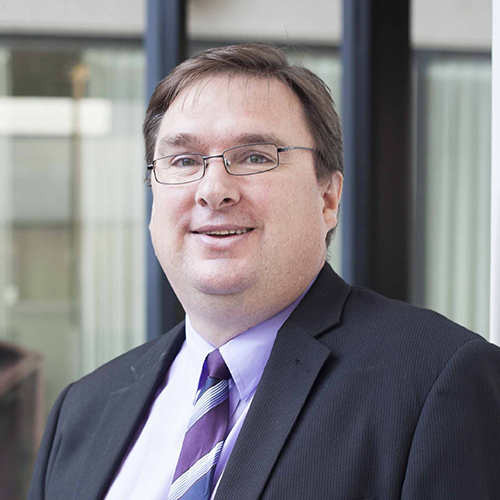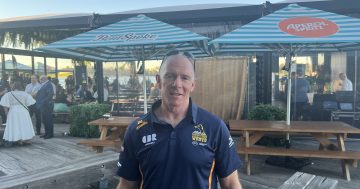
In this exclusive excerpt from Life without lanyards, former public servant Scott Monson shares his journey from struggling with a stutter to professional speaker and trainer.
Joining the public service was my first real job. It was all a big adventure for me. I moved up from Tasmania to Canberra to train as a naval architect with the Department of Defence. That was in the gender integration period, where we were designing ships to accommodate women. It was interesting work, and I loved the people. Loved Canberra.
The reason I got out of the technical field and more into the admin side was quite pragmatic. The department was going through one of those periods where they contract a lot of the technical work out. So I thought, ‘If I want to create a long-term career in Defence, I should get into contract management’. I became a procurement expert, and then from there got into business improvement.
The first few years of the change management experience were really good. I enjoyed bringing my expertise into a space where I could use it for a different purpose. Not just to deliver projects, but also to improve the environment that shapes how they’re delivered.
Then I noticed that the conversations I was having were exactly the same conversations I’d had five years ago. There was a lot of lip service to change management. I mean, Defence was having major reviews every two or three years. Every review came with another 20 or 30 recommendations, and we hadn’t even finished implementing those before another review came through. There was just this culture of demonstrating the appearance of change rather than implementing real improvements.
All of this was happening at a time of transformation for me. Back then, I had little control of a lifelong stutter, so I was avoiding giving presentations all the time. There was no way I was standing out in front of 100 people to give a speech. There was no way I was standing in front of 10 people. I used to delegate all that work to my staff under the guise of professional development.
I was asked to give one presentation where I was the subject-matter expert. I delegated it to one of my staff. Not to criticise him, but he had a hard time and that was noticed by pretty much all present. The next day, my boss called me into his office and asked me to shut the door. He said, ‘Mate, you really set him up for a fall. Why did you do it?’
I said to him — and this is the first time I’d ever said these words — I said that I was too scared to do the talk. As soon as those words escaped, I had a blinding realisation that I didn’t want to be the kind of boss who asks other people to do what they’re not willing to do themselves. That’s what I’d been doing for so long.
I got serious about addressing my stuttering and my speech. That ultimately led me to realise that I’d been living in a nice, safe place for a long time.
I’d always wanted to be a helper of some sort. When I grew up, ‘coaching’ wasn’t really a word that was used. But certainly in terms of teachers and counsellors, yes, I’d seen a lot of those in my early 20s, going through issues with my speech and whatnot. I was generally quite disappointed with the service. A few times, I walked out of there thinking, quite arrogantly, ‘I could do a better job than that’.
What turned me away from either teaching or going into that helping role was thinking, ‘What if people come to see me, hear me stuttering out of control and go “You’ve got bigger problems than me. How can you help?”’
Once I started to get some control around my speech, and once I built my belief and my confidence that I could speak well, I thought, ‘This is the time’. Time to stop holding back. To get up in front of that classroom and become that teacher.
My process of leaving the public service was quite a methodical one. I didn’t want to just jump out, so I studied counselling part-time while still at Defence. I got my qualifications and ran some workshops for about two years. I also talked to professional coaches to find out how they did things. Defence was offering redundancy packages, so when I was ready to leave, the timing was perfect.
That all sounds quite logical and positive, but it was also an extremely scary thing to do. I was pretty safe in Defence. I was performing well, so I wasn’t going to lose my job. Suddenly not only my security, but the security of my family depended on a whole other level of performance, and doing something I’d never done before: being a full-time coach and running my own business. It took me by surprise in that first year and a half, just how much of that pressure I felt. How much I took those fortnightly deposits into my bank account for granted.
Working in the public service is not an easy job. There’s a lot of pressure, and uncertainties. But even at its worst, that doesn’t even come close to the pressure to perform that I feel now.
How I deal with it is having that belief in what I’m doing. My whole approach and my whole philosophy is about bringing possibilities to life. That’s what gets me out of bed every morning. It’s what my own transformation looks like — bringing something out there that I always wished was possible. Even talking about it now, I feel the buzz that I get from helping other people. Every day there’s a different person I can get to know. I get a lot more perspective now, and different insights from people all the time.
What you do has to excite you enough to get out of bed every morning. You need to motivate yourself and keep yourself on track, because in small business there isn’t anyone else to do it. You don’t have someone saying, ‘Where’s that brief? I need it on my desk by five o’clock’. You need to find that within yourself.
Today, Scott is a speaker, accredited coach and director of 4D Learning. You can learn more about Scott and 4D Learning at www.4dl.com.au.
Win a copy of Life without lanyards – from public servant to entrepreneur by Matt Fenwick. Let us know one good thing about being your own boss. Email amy@the-riotact.com by 5pm Tuesday 15 September 2015. Learn more about Life without lanyards: www.lifewithoutlanyards.com.





















